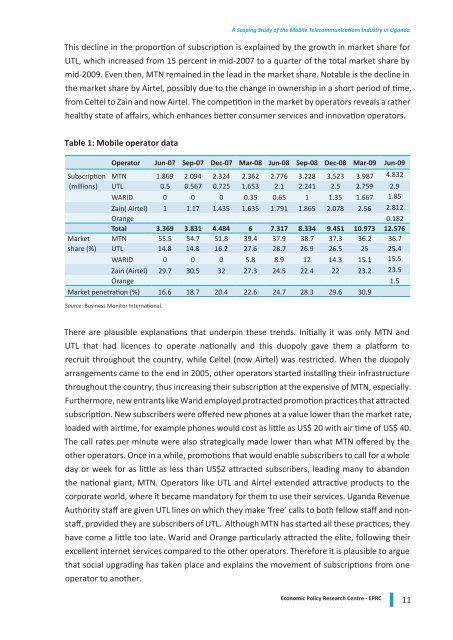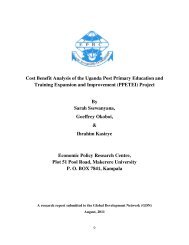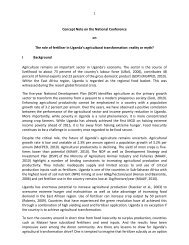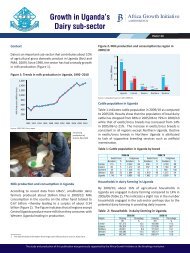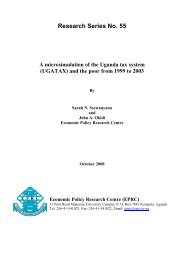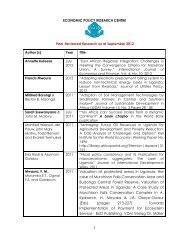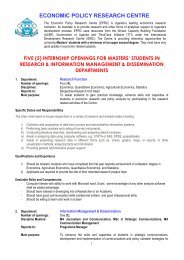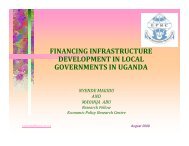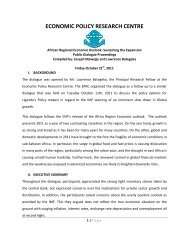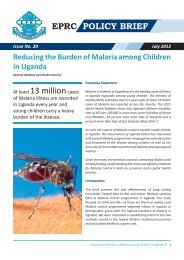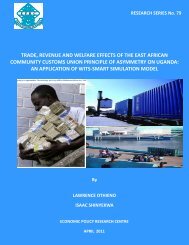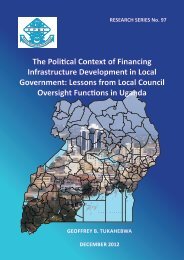A SCopINg StUdY of tHE MoBIlE ... - AgEcon Search
A SCopINg StUdY of tHE MoBIlE ... - AgEcon Search
A SCopINg StUdY of tHE MoBIlE ... - AgEcon Search
You also want an ePaper? Increase the reach of your titles
YUMPU automatically turns print PDFs into web optimized ePapers that Google loves.
A Scoping Study <strong>of</strong> the Mobile Telecommunications Industry in Uganda<br />
This decline in the proportion <strong>of</strong> subscription is explained by the growth in market share for<br />
UTL, which increased from 15 percent in mid-2007 to a quarter <strong>of</strong> the total market share by<br />
mid-2009. Even then, MTN remained in the lead in the market share. Notable is the decline in<br />
the market share by Airtel, possibly due to the change in ownership in a short period <strong>of</strong> time,<br />
from Celtel to Zain and now Airtel. The competition in the market by operators reveals a rather<br />
healthy state <strong>of</strong> affairs, which enhances better consumer services and innovation operators.<br />
Table 1: Mobile operator data<br />
Operator Jun-07 Sep-07 Dec-07 Mar-08 Jun-08 Sep-08 Dec-08 Mar-09 Jun-09<br />
Subscription MTN 1.869 2.094 2.324 2.362 2.776 3.228 3.523 3.987 4.832<br />
(millions) UTL 0.5 0.567 0.725 1.653 2.1 2.241 2.5 2.759 2.9<br />
WARID 0 0 0 0.35 0.65 1 1.35 1.667 1.85<br />
Zain( Airtel) 1 1.17 1.435 1.635 1.791 1.865 2.078 2.56 2.812<br />
Orange 0.182<br />
Total 3.369 3.831 4.484 6 7.317 8.334 9.451 10.973 12.576<br />
Market MTN 55.5 54.7 51.8 39.4 37.9 38.7 37.3 36.2 36.7<br />
share (%) UTL 14.8 14.8 16.2 27.6 28.7 26.9 26.5 25 25.4<br />
WARID 0 0 0 5.8 8.9 12 14.3 15.1 15.5<br />
Zain (Airtel) 29.7 30.5 32 27.3 24.5 22.4 22 23.2 23.5<br />
Orange 1.5<br />
Market penetration (%) 16.6 18.7 20.4 22.6 24.7 28.3 29.6 30.9<br />
Source: Business Monitor International.<br />
There are plausible explanations that underpin these trends. Initially it was only MTN and<br />
UTL that had licences to operate nationally and this duopoly gave them a platform to<br />
recruit throughout the country, while Celtel (now Airtel) was restricted. When the duopoly<br />
arrangements came to the end in 2005, other operators started installing their infrastructure<br />
throughout the country, thus increasing their subscription at the expensive <strong>of</strong> MTN, especially.<br />
Furthermore, new entrants like Warid employed protracted promotion practices that attracted<br />
subscription. New subscribers were <strong>of</strong>fered new phones at a value lower than the market rate,<br />
loaded with airtime, for example phones would cost as little as US$ 20 with air time <strong>of</strong> US$ 40.<br />
The call rates per minute were also strategically made lower than what MTN <strong>of</strong>fered by the<br />
other operators. Once in a while, promotions that would enable subscribers to call for a whole<br />
day or week for as little as less than US$2 attracted subscribers, leading many to abandon<br />
the national giant, MTN. Operators like UTL and Airtel extended attractive products to the<br />
corporate world, where it became mandatory for them to use their services. Uganda Revenue<br />
Authority staff are given UTL lines on which they make ‘free’ calls to both fellow staff and nonstaff,<br />
provided they are subscribers <strong>of</strong> UTL. Although MTN has started all these practices, they<br />
have come a little too late. Warid and Orange particularly attracted the elite, following their<br />
excellent internet services compared to the other operators. Therefore it is plausible to argue<br />
that social upgrading has taken place and explains the movement <strong>of</strong> subscriptions from one<br />
operator to another.<br />
Economic Policy Research Centre - EPRC<br />
11


